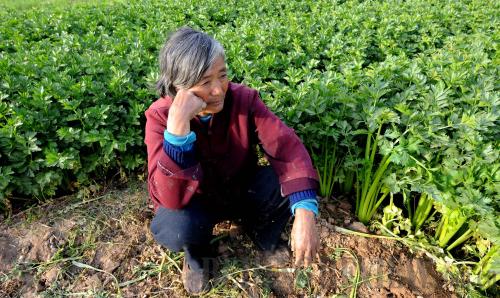|
 |
|
CONTEMPLATING THE FUTURE: Xing Surong, a farmer in Mingshanlu Village, Zhongmu County of Henan Province, sits in her celery field. The celery has been selling poorly as prices drop (ZHU XIANG) |
Fluctuations of vegetable prices in China have recently caused near panic in the domestic market. Purchase prices for farm produce are decreasing dramatically, causing farmers to hemorrhage money. But in city markets, vegetable prices remain high. This contrast has forced the Ministry of Commerce (MOFCOM) to implement a series of measures to avoid instability that might eventually befall the entire Chinese economy.
Yao Jian, a MOFCOM spokesman, says the ministry now requires local commerce departments to adopt measures to stabilize vegetable prices and market operations. These departments must also establish close links with agricultural departments to alleviate farmers' difficulties in selling their products.
Now, as economists search for an explanation behind this strange phenomenon, people worry the low prices may force farmers to abandon their planting fields, which will ultimately cause vegetable prices to soar even higher. Already faced with pressure from inflation, China will need to take steps to avoid further economic setbacks.
The blame
Han Jin, a 39-year-old vegetable farmer, lived a simple rural life, growing cabbages with his family on 0.4 hectare of land in Tangwang Township, Shandong Province. But on April 16 this year, cabbage prices bottomed out, falling from 1.2 yuan ($0.18) per kg to 0.16 yuan (less than $0.03) per kg. Han suffered a big blow. With his hopes of repaying the 10,000 yuan ($1,538) debt on his farm dashed, Han took his own life.
Besides cabbage, prices of spinach, celery and an assortment of other produce have all fallen dramatically. With few people willing to purchase these products, farmers are opting to leave their vegetables in the field as fertilizer for future harvests.
What's difficult to understand is how purchasing prices in Shandong, a major vegetable-producing province supplying more than half of the cabbage needs in Beijing and Tianjin, dropped to 0.16 yuan per kg on April 16 when prices at supermarkets in the two cities floated between 1.6 yuan and 2 yuan ($0.25-0.31).
The drastic price decrease of certain vegetables was due to the higher prices of such produce in 2009 and 2010. Many farmers have also been blamed for over planting, making the supply of vegetables surpass demand.
Sun Jixiang, Secretary General of the Shandong Vegetable Association, says these accusations are just not true. Although the price of Chinese cabbage has decreased rapidly, Sun said, the planting area has not increased compared with previous years. In 2009, the planting area for cabbage in Shandong was 233,333 hectares, while in 2010 it was 246,667 hectares and has held constant in 2011. Price fluctuations of vegetables are not completely caused by blind planting on farmers' parts.
Another assertion holds that increasing costs in intermediate links in the farm-to-market process have caused the price difference. In recent years, planting and labor costs have been on the rise. Also, on April 7, 2011, the National Development and Reform Commission (NDRC) raised the prices of refined oil, adding to transportation costs for all commodities. To absorb these costs, vegetable dealers are depressing purchasing prices and maintaining higher selling prices to make a profit.
Yan Shujun, assistant chief economist with the China Logistics Information Center (CLIC), says the logistics link may be to blame for the higher prices of vegetables in the market, but the profits are not earned by logistics companies.
The growing logistics costs, Yan said, are due to high toll fees and rising oil prices. This indicates that the actual benefits of increasing vegetable prices may be taken by toll collectors, not vegetable dealers.
In the first quarter of this year, say CLIC figures, China's total logistics fees hit 1.7 trillion yuan ($261.54 billion), up 17.9 percent year on year. Among all logistics fees, transportation was the largest at about 940 billion yuan ($144.62 billion), a year-on-year increase of 13.6 percent, accounting for 54.2 percent of all logistics fees.
|
